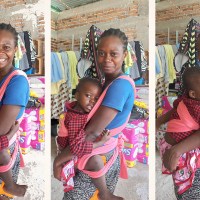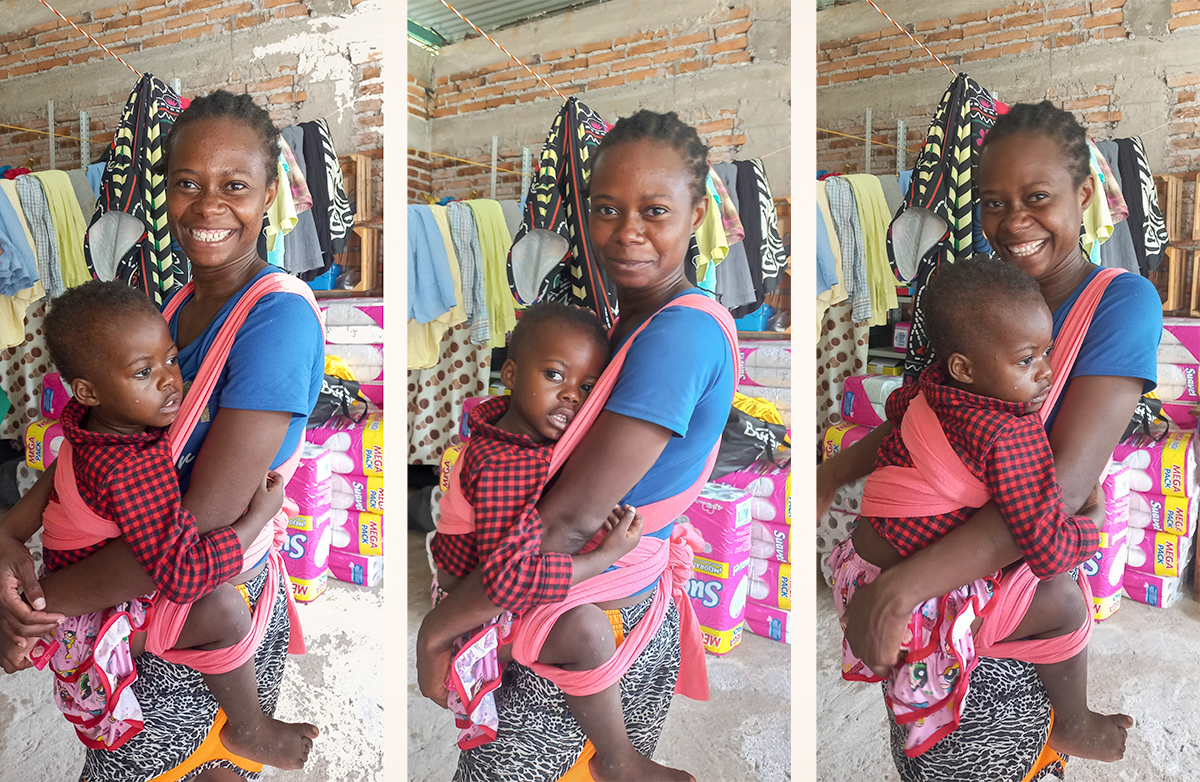Judith never stops smiling. Sometimes she looks down at her little baby and sometimes at the clothes she is folding in the storeroom. Her energy is contagious.
We’ve stopped in to spend time with some of our partners at a welcome center in Tapachula, Mexico, where we support asylum seekers with easy-to-carry food kits and child-care kits. There is an open-air space with long tables and chairs meant for gathering, bathrooms, a basic kitchen, and a storeroom, all circling a bright green patch of grass. Here, our asylum-seeking friends can have a meal, take a shower, play, be listened to, and get some basic necessities for themselves and their children, all while being protected from the sun and rain by a roof and leafy trees. It’s a peaceful place to spend a little time—something precious for those who have traveled thousands of kilometers in search of a new home.
The nuns and volunteers from the neighborhood who run this program walk from one place to another, bringing food or sitting with migrant friends to talk about their journeys and their lives in this city. None of the new friends we talk with ever imagined how precarious their situation would be at this point in their journey. In the border city of Tapachula, where they have to stop for sometimes months to get the correct government registrations they need to continue their journey, they have nothing. Any money they left home with has been spent or taken by various government authorities or at impromptu checkpoints set up by cartels. There are few government programs here to support them during their wait for official documents, and they are not legally allowed to work during that wait.
A little girl comes to us and offers her tiny hand at the door of the storeroom.
“Do you want to shake our hands?” we ask her. “You’re so beautiful. You are so polite,” we tell her. After shaking our hands, she smiles and runs inside the room. A laugh is heard. This is Judith’s daughter.
We offer Judith a baby wrap, as we’ve been offering to other parents making the long journey toward a safe place to live. She looks at us with curiosity.
“Like in Congo?” Judith asks, in Spanish.
“Yes, like in Congo,” answers one of the nuns.
“It can help you to carry your child with you, so she doesn’t get tired, hurt, or lost during your journey,” we explain.
“Yes, yes!” Judith replies. “I know, we use them in Congo. But we put our babies on our backs.”
“Do you want to try it in a different way?” we ask her. And yes, laughing, she tries it. It reminds her of her homeland.
We help her to put the fabric around her skinny body and show her how to use it in another way. After we finish, we lift her daughter into her arms. Judith hugs her, and the little girl stays in the soft, warm arms of her mom. When Judith lets go, she feels her arms are free.
Judith comes from Congo, in central Africa. She earned a scholarship to become a nurse in Cuba, so she moved there to study. In Cuba, she met a man, got pregnant, and had her little daughter. However, there were not enough opportunities in Cuba, so she was forced to leave. She moved to Ecuador next, and soon after that, to Central America.
“Did you cross the Darien Gap with your daughter?” we ask, about a dangerous stretch of land where countless asylum seekers have lost their lives.
“No,” Judith tells us. They took a boat that followed the coast of Panama. But it was still a treacherous trip. She tells us about the big waves, the poor conditions and high speed of the boat. Eventually, Judith and her daughter made their way north to Tapachula, Mexico, where she is staying with friends also from Congo.
“Are they also very outgoing, like you?” we ask.
“No, no! They are so shy. I am the one who talks more!”
Judith comes to the welcome center because she knows she has a chance to get food here, get clothes for her little child, and take a shower. Today, she also got a baby wrap that reminds her homeland. Judith finds friendship and conversations—connections that are as life-giving as the more tangible supplies. Here, Judith and her fellow travelers are seen, heard, and valued.
“Will we see you again?” we ask Judith, as we get ready to leave.
“Yes, yes!” she answers. Judith thanks us for everything, and as we leave, we’re grateful too. We’re grateful that something simple like a baby wrap can make someone remember home while looking for a new one. We’re grateful for unexpected friendships, for the chance to help with a little food, and for the privilege of hearing her story and getting to walk alongside her for a little of her life journey. And we’re grateful for our global community of peacemakers who make all of this possible.


